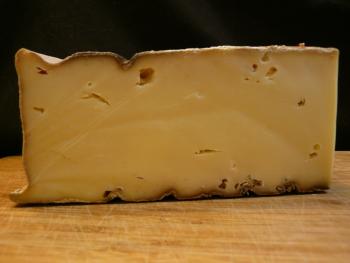Vacherin Fribourgeois
- Country
- Switzerland
- Region
- Bulle, Fribourg & Jura
- Size
- 16 ins diameter, 3 ins high
- Weight
- 15 lbs approx
- Website
- Milk
- Cow
- Classification
- Semi Soft
- Rennet
- Animal
- Rind
- Washed

Vacherin Fribourgeois (not to be confused with Vacherin Mont d'Or) is mentioned in the earliest records of fondues, about 1,000 years ago. Today it is made by a small number of local artisanal cheesemakers, most of whom have a difficult time justifying the effort that goes into making a genuine Vacherin Fribourgeois - hence it has become something of an endangered species.
Milk comes from the Fribourgeois breed of cows, which is the local name for Holsteins.
The leading production area for Vacherin is the region between the towns of Bulle (Canton Vaud) and Fribourg (Canton Fribourg in western-central Switzerland. However, it is also made in other parts of western Switzerland, right up to the Jura Mountains on the border with France.
Production takes place in small artisanal dairies and one of the best versions comes from the producers of the Vacherin Fribourgeois co-op in Bulle, and is matured by Rolf Beeler.
Cheeses are pressed and uncooked and have a washed rind that is cured for between three and four months. It is a painstaking and ancient method, with repeated washings and turnings.
Vacherin Fribourgeois has a thick, brown-gray-red, undulating wavy rind, with an underlying cross-hatch pattern and tinges of yellow, grey or pink. The paste is light yellow and very smooth, often with eyes and/or some slits.
Firm, yet relatively soft compared with other typical Swiss cheeses,such as Guyère, it has a distinctive aroma reminiscent of a pleasant sourness. Overall, Vacherin Fribourgeois has both pronounced aromas and flavors, underpinned by a consistent milky character, fresh cut hay and nuts.



